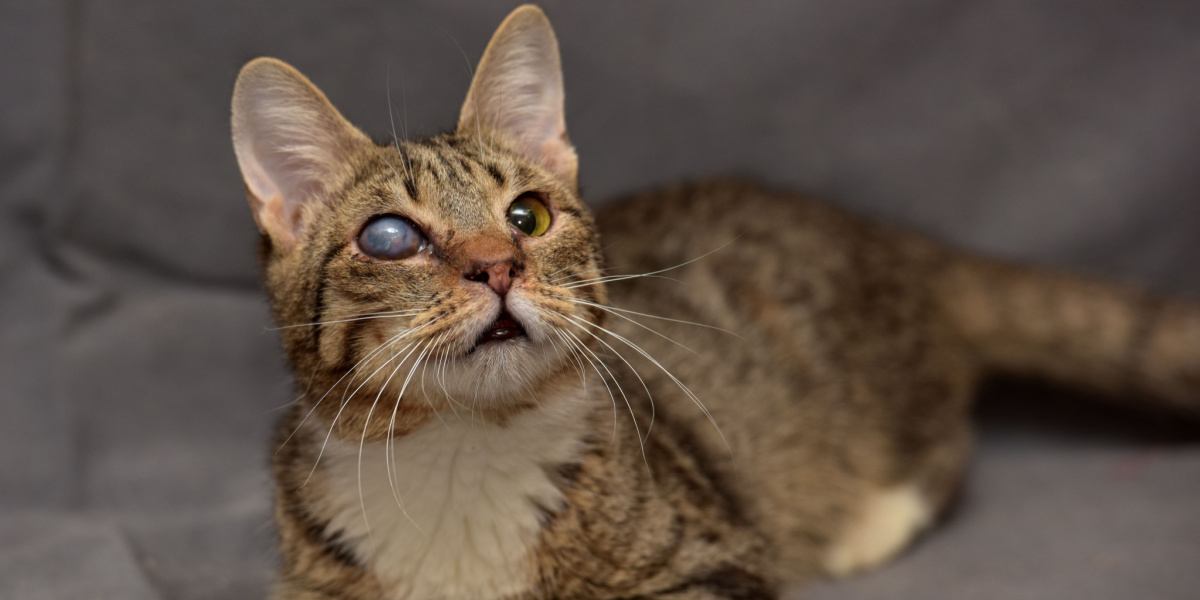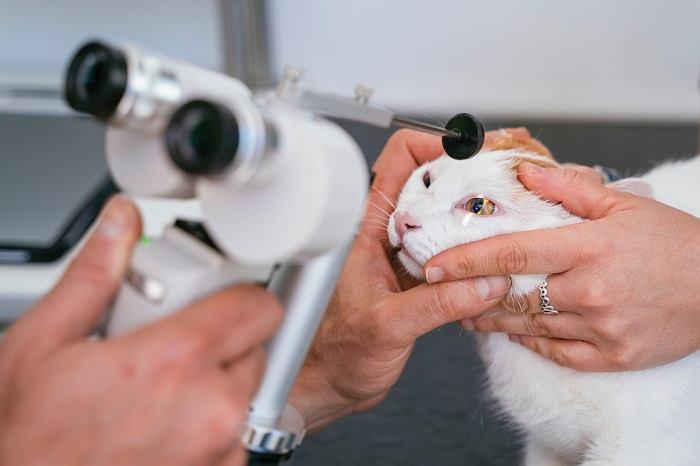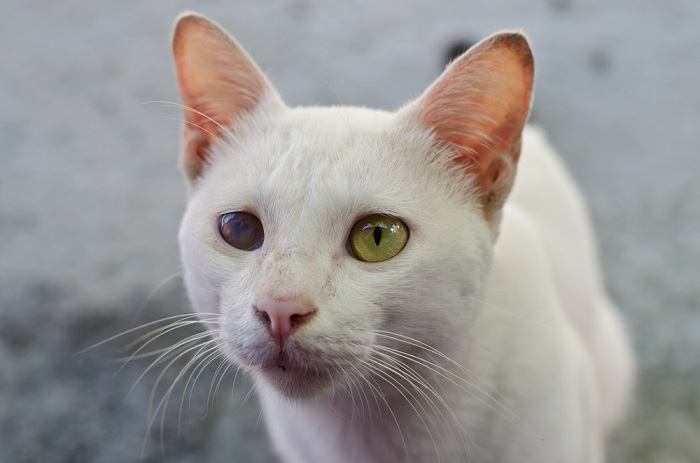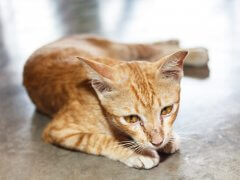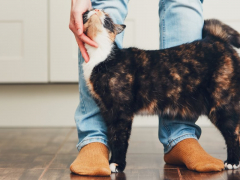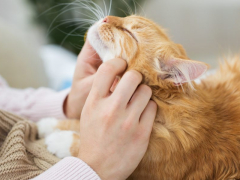Retinal detachment in cats is a serious condition where the retina in their eye becomes loose and starts to come away.
The retina is a thin layer at the back of the eyeball that processes light coming into the eye and sends this information to your cat’s brain to create the images that they see. Because the retina plays such an important role in your cat’s vision, retinal detachment can cause permanent blindness if it is not treated quickly.
Sudden retinal detachment in cats is an emergency situation. If you are worried your cat could have a detached retina you should take them to your veterinarian straight away.
Causes of Retinal Detachment in Cats
Retinal detachment in cats can affect one or both of their eyes. If both of your cat’s eyes are affected, it is usually because of an underlying condition affecting their whole body, such as:
- Systemic hypertension (high blood pressure)
- Hyperthyroidism (an overactive thyroid gland)
- Kidney disease
- Certain types of infectious diseases
- Immune conditions
- Toxicity or poisoning
If only one of your cat’s eyes is affected, the cause is more likely something specific to the eye itself, such as:
- A congenital or inherited condition, which is a condition that your cat was born with
- Trauma
- A cataract
- Inflammation in the eye
- Neoplasia (a tumor) in the eye
- Glaucoma (a condition where pressure builds up within the eyeball)
- A complication due to eye surgery
Symptoms of Retinal Detachments in Cats
If your cat is suffering from a detached retina, the main sign you will notice at home is a change in their vision. They will seem disoriented, bump into things, miss their landing when jumping, or choose to walk around the edge of the room. Sometimes they simply become very inactive because they do not feel confident to move around.
You might also notice that the size of their pupil does not change in response to light.
Sudden onset blindness is an emergency in cats. If you notice any of these changes you must take you cat to your veterinarian straight away.
Diagnosis of Retinal Detachment in Cats
A prompt visit to the veterinarian is important if you notice changes in your cat’s vision.
Your veterinarian will begin by taking a thorough history. They will complete a full clinical examination and a thorough ophthalmic examination. This will include looking inside your cat’s eyes using a specialized instrument called an ophthalmoscope. They will check the retina for signs of detachment, and look for any burst blood vessels as these can be a sign of high blood pressure.
If there is something preventing them from seeing through into the back of the eyeball, your veterinarian may need to perform an ultrasound instead. For example, if there is a hemorrhage inside the eye after trauma.
The most common cause of retinal detachment in cats is high blood pressure. Therefore, your veterinarian will want to check your cat’s blood pressure. They might also recommend a complete blood count (including kidney values and thyroid hormone) to check for an underlying health condition.
Treatment of Retinal Detachment in Cats
Whether treatment for retinal detachment in cats is possible depends on the underlying cause. Unfortunately, if the cause is specific to the eye itself (eg. trauma or a congenital condition), retinal detachment is not usually treatable.
If the cause of the detachment is an underlying condition, sometimes treating this condition quickly will allow the retina to reattach on its own. For instance, if your cat has high blood pressure, they can be started on medication (such as amlodipine) to reduce it. If this medication is started quickly enough, sometimes the retina will reattach itself and your cat’s vision may come back.
Can Detached Retina Be Repaired in Cats?
In rare circumstances, surgery or laser therapy can be performed to re-attach the retina. This procedure can only be done by a specialist veterinary ophthalmologist.
Unfortunately, in many cases, retinal detachment cannot be treated, and vision loss is permanent.
Home Remedies for Treating Retinal Detachment in Cats
It is normal to want to know if you can help your cat at home. Unfortunately, there are no home remedies that you can use to treat retinal detachment in cats.
Prognosis of Retinal Detachment in Cats
Very quick treatment by a veterinarian may allow some vision to be restored in a cat with retinal detachment, particularly if it is only a partial detachment.
Recovery is most common in retinal detachments caused by high blood pressure. But, in most cases, permanent blindness is likely to occur.
Most cats will cope well long-term if they are affected by blindness in just one eye, although it may be advisable to keep them inside the house. Even cats with complete blindness can adapt to live happy lives with adjustments to their care.
Preventing Retinal Detachment in Cats
Not all causes of retinal detachment in cats can be prevented. Your cat may already have been born with a condition affecting their eye, or they may suffer an accident.
However, careful monitoring by your veterinarian will help to identify risk factors for retinal detachment as early as possible. This is particularly important as your cat gets older.
High blood pressure is the most common cause of retinal detachment in older cats. Therefore, as your cat reaches their senior years, they should have their eyes and blood pressure checked every 3-6 months. Older cats should also have routine blood screens (including kidney and thyroid tests) every 6-12 months.
Conclusion
If your cat’s retinal detachment is not treatable, rest assured that partial and even complete blindness does not mean your cat can’t lead a happy and full life.
Retinal detachment in cats is a serious condition that can cause them to lose their sight permanently. So, if you notice any sudden changes in your cat’s vision, you should take them to your veterinarian immediately. Sometimes, with quick veterinary treatment, some vision can return. But sadly, in many cases, the blindness will be permanent.
The best way to prevent retinal detachment in cats is regular checks with your veterinarian – particularly as they get older.
Also Read: Why Do Cats Blink?
Frequently Asked Questions
What does retinal detachment look like in a cat?
The only way to see if your cat's retina is detached is by your veterinarian using a special instrument, called an ophthalmoscop to look into the back of your cat’s eye.
When your veterinarian looks into the eye with the ophthalmoscope, an area of the fundus (the inner surface of the eye) may look less shiny compared to its normal appearance. If it is completely detached, they may see a thin grey membrane with retinal blood vessels floating at the back of the eye.
How long does it take for a cat's retinas to reattach?
With prompt treatment of the underlying cause (such as high blood pressure), a cat’s retina can re-attach and some vision may be restored. This can happen over several days to several weeks.
Unfortunately, for many cats, retinal detachment is permanent.
Can retinal detachment be cured itself?
Retinal detachment often occurs due to an underlying problem. This could be due a systemic condition (a condition affecting the whole cat’s body) such as high blood pressure. If this condition is treated promptly by your veterinarian, sometimes the retina will re-attach and some vision will be restored.
Retinal detachment does not cure itself without treatment by a veterinarian.
What might an owner notice about their cat's behavior if their cat had a detached retina?
You might notice your cat bumping into things at home. Or, they might not be able to find familiar objects such as their food or water bowl. As blindness can affect your cat's confidence, you may simply notice that they are not wanting to move around.
If you notice any changes in your cat’s vision you should take them to see your veterinarian straight away.
